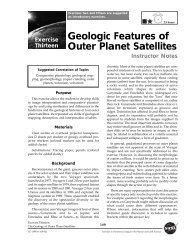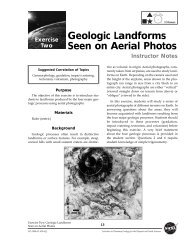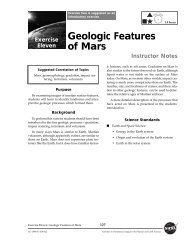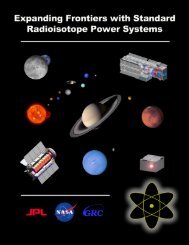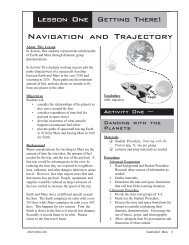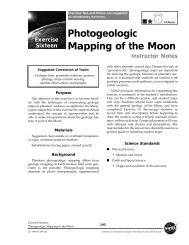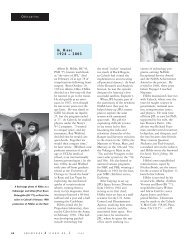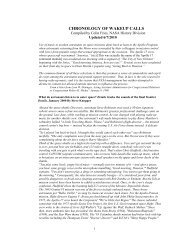Vision and Voyages for Planetary Science in the - Solar System ...
Vision and Voyages for Planetary Science in the - Solar System ...
Vision and Voyages for Planetary Science in the - Solar System ...
Create successful ePaper yourself
Turn your PDF publications into a flip-book with our unique Google optimized e-Paper software.
organisms live <strong>the</strong>re now?” Titan’s complex atmosphere exhibit<strong>in</strong>g a global methane cycle ak<strong>in</strong> to Earth’s<br />
hydrological cycle is key to <strong>the</strong> underst<strong>and</strong><strong>in</strong>g <strong>the</strong> Work<strong>in</strong>gs of <strong>the</strong> <strong>Solar</strong> <strong>System</strong> <strong>the</strong>me <strong>and</strong> <strong>the</strong> question<br />
“can underst<strong>and</strong><strong>in</strong>g <strong>the</strong> roles of physics, chemistry, geology, <strong>and</strong> dynamics <strong>in</strong> driv<strong>in</strong>g planetary<br />
atmospheres <strong>and</strong> climates lead to a better underst<strong>and</strong><strong>in</strong>g of climate change on Earth?” F<strong>in</strong>ally, <strong>the</strong> giant<br />
planet satellites exhibit an enormous spectrum of planetary conditions, chemistry, <strong>and</strong> processes—<br />
contrast<strong>in</strong>g those of <strong>the</strong> <strong>in</strong>ner solar system <strong>and</strong> stretch<strong>in</strong>g our scientific imag<strong>in</strong>ations <strong>in</strong> “how have <strong>the</strong><br />
myriad chemical <strong>and</strong> physical processes that shaped <strong>the</strong> solar system operated, <strong>in</strong>teracted, <strong>and</strong> evolved<br />
over time?”<br />
SCIENCE GOALS FOR STUDIES OF PLANETARY SATELLITES<br />
The planetary science community has made remarkable progress over <strong>the</strong> past decade <strong>in</strong><br />
underst<strong>and</strong><strong>in</strong>g <strong>the</strong> major satellites of <strong>the</strong> giant planets (Table 8.2), but despite this progress, important<br />
questions rema<strong>in</strong> unanswered. The committee has developed some specific high-level goals <strong>and</strong><br />
associated objectives to guide <strong>the</strong> cont<strong>in</strong>ued advancement of <strong>the</strong> study of planetary satellites. The goals<br />
cover <strong>the</strong> broad areas of orig<strong>in</strong> <strong>and</strong> evolution, processes, <strong>and</strong> habitability. They are as follows:<br />
• How did <strong>the</strong> satellites of <strong>the</strong> outer solar system <strong>for</strong>m <strong>and</strong> evolve?<br />
• What processes control <strong>the</strong> present-day behavior of <strong>the</strong>se bodies?<br />
• What are <strong>the</strong> processes that result <strong>in</strong> habitable environments?<br />
Each of <strong>the</strong>se goals is described <strong>in</strong> more details <strong>in</strong> subsequent sections.<br />
TABLE 8.2 Major Accomplishments by Ground- <strong>and</strong> Space-based Studies of <strong>the</strong> Satellites of <strong>the</strong> Giant<br />
Planets <strong>in</strong> <strong>the</strong> Past Decade<br />
Major Accomplishments Mission <strong>and</strong>/or Techniques<br />
Discovered an active meteorological cycle on Titan,<br />
<strong>in</strong>volv<strong>in</strong>g liquid hydrocarbons <strong>in</strong>stead of water.<br />
Discovered endogenic activity on Enceladus, <strong>and</strong> found that<br />
<strong>the</strong> Enceladus plumes have a major impact on <strong>the</strong> saturnian<br />
environment.<br />
Greatly improved our underst<strong>and</strong><strong>in</strong>g of <strong>the</strong> orig<strong>in</strong> <strong>and</strong><br />
evolution of Titan’s atmosphere <strong>and</strong> volatile <strong>in</strong>ventory, <strong>and</strong><br />
its complex organic chemistry.<br />
Major improvement <strong>in</strong> characteriz<strong>in</strong>g <strong>the</strong> processes,<br />
composition <strong>and</strong> histories <strong>for</strong> all <strong>the</strong> saturnian satellites.<br />
Developed new models improv<strong>in</strong>g our underst<strong>and</strong><strong>in</strong>g of<br />
Europa, Io, <strong>and</strong> <strong>the</strong> o<strong>the</strong>r Galilean satellites.<br />
Cass<strong>in</strong>i <strong>and</strong> Huygens; ground-based<br />
observations.<br />
Cass<strong>in</strong>i<br />
Theory <strong>and</strong> model<strong>in</strong>g based on Cass<strong>in</strong>i <strong>and</strong><br />
Huygens’ data<br />
Theory <strong>and</strong> model<strong>in</strong>g based on Cass<strong>in</strong>i data<br />
Theory <strong>and</strong> model<strong>in</strong>g based on Galileo data;<br />
ground-based observations; <strong>and</strong> Cass<strong>in</strong>i <strong>and</strong><br />
New Horizons.<br />
HOW DID THE SATELLITES OF THE OUTER SOLAR SYSTEM FORM AND EVOLVE?<br />
Underst<strong>and</strong><strong>in</strong>g <strong>the</strong> orig<strong>in</strong> <strong>and</strong> evolution of <strong>the</strong> satellites is a key goal of satellite exploration.<br />
Satellite composition <strong>and</strong> <strong>in</strong>ternal structure (particularly <strong>the</strong> state of differentiation), provide important<br />
clues to <strong>the</strong> <strong>for</strong>mation of <strong>the</strong>se worlds <strong>and</strong> <strong>the</strong>ir parent planet, <strong>and</strong> <strong>the</strong> orig<strong>in</strong> <strong>and</strong> evolution of volatile<br />
species are of particular <strong>in</strong>terest. Orbital evolution, <strong>and</strong> its <strong>in</strong>timate connections to tidal heat<strong>in</strong>g, provides<br />
PREPUBLICATION COPY—SUBJECT TO FURTHER EDITORIAL CORRECTION<br />
8-4



